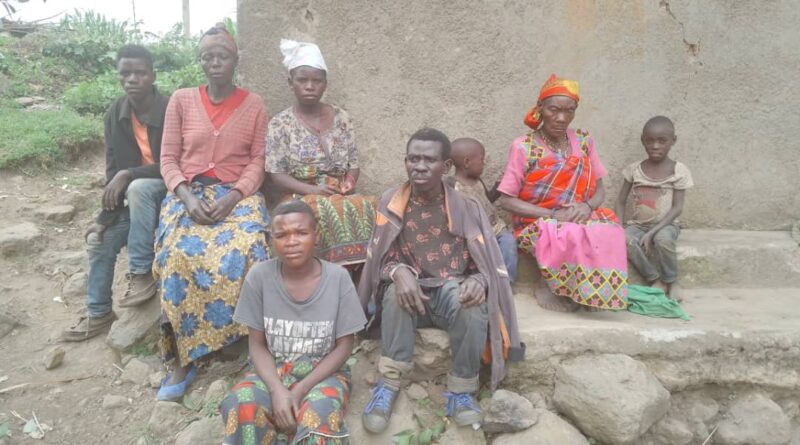Displaced families face increased hardship as Climate Change disrupts livelihoods in post-resettlement agriculture
22 Families Marginalized by History Face Worsening Conditions Due to Climate Change, Impacting Agriculture in Their Cooperative After Being Displaced from the Volcano Forest for the Expansion of the National Park
These families report that life has worsened after they were relocated from the Muhabura volcanic forest to make way for the expansion of Volcanoes National Park and settled into villages, with the aim of improving their standard of living. However, climate change has had devastating effects on their agricultural activities within their cooperative.
While living in the forest in Kamanga and Mugarama, life was more manageable, with access to food and some income from poaching animals for meat and selling firewood harvested from the forest. After facing significant environmental changes, these families were relocated to the Nyagisenyi settlement in Kabyiniro, Cyanika Sector, with three families in Irohero and the rest in Nyagisenyi.
Residents we spoke to described how environmental changes affected their livelihoods upon relocation. Initially, they were provided with modern homes but were left without any sustainable jobs or income sources to sustain their daily needs.
Anonsiyata Nyirabuduri, displaced from Mugeshi in Mugarama to Nyagisenyi, said, “Before, we used to go into the forest, hunt for meat, and gather fruits for food. We would sell firewood to make some money, which helped us take care of our families. Today, living here, things have changed. We have no work; we just sit and hope someone will offer us some food by the end of the day.”
The families, who are part of a cooperative called “Abishyize hamwe nta kibananira,” receive support from the Red Cross, which provided them with a piece of land under one hectare to cultivate and share the produce. However, they say this is insufficient, especially since climate change—with heavy rains or extreme heat—often negatively impacts their harvests. When they do manage a good yield, each family receives only 20 kilograms of produce, but during bad seasons, they may get nothing.
Nyirabuduri explains, “We are 22 families in the cooperative, cultivating that single plot of land. When we have a good harvest, each family receives 20kg. But when the weather is unfavorable, like excessive rain or prolonged drought, the harvest fails.”
She adds, “One must ask: what happens when we plant but don’t harvest, and there are no other jobs? How do we survive? The 20kg ration per family has to cover all basic needs like salt, soap, cooking oil, and more. But for families with more than three children—up to five or more—it lasts less than a week.”
The absence of regular employment has trapped these families in perpetual poverty. Mukanoheri Perusi remarks, “We don’t work to save, we only work to eat. We barely make 1,500 RWF daily, and if you’re lucky enough to have a partner who can help, you might make 3,000 RWF, which allows you to buy supplements like vegetables for the children instead of just sweet potatoes.”
Living hand-to-mouth has had a ripple effect on their social and economic conditions. “We can’t even afford new clothes, and the children are not in school. They are supposed to be the future but are being held back by the current conditions,” Mukanoheri continues.
The residents believe that lack of proper government follow-up has contributed to their deteriorating conditions. Some families have even resorted to theft out of desperation. Hanezerwabake Sebantu mentions, “Some of our children have taken to stealing from neighboring fields because they are hungry and have nothing to do at home. This has stigmatized us in the community. People see us as thieves or beggars.”
Local government officials, however, argue that the families have not yet fully adapted to farming and livestock keeping. Burera District’s Vice Mayor in charge of Social Affairs, Theophile Mwanangu, said, “These families were relocated from the Muhabura volcanic forest and provided with new houses equipped with kitchens. Many of them joined the cooperative to learn agriculture, a skill they weren’t familiar with because they used to rely on hunting and cutting down trees.”
“Many of them still own land, but they prefer renting it out for cash rather than farming it themselves. We are planning to step up awareness campaigns to encourage them to farm their land and refrain from leasing it out. We will assign an officer to monitor these activities closely to ensure progress,” he added.
The vice mayor also pointed out that the government is intensifying efforts to guide the families on how to manage their resources and properties, including the houses they were given. He specifically mentioned Nyirabuduri, who allegedly dismantled part of her kitchen to sell the wood and roofing iron sheets to buy food.
The families argue that government officials rarely visit them to check on their welfare. They say they don’t know their leaders from the village to the district level, which makes them feel abandoned. Mwanangu admits that this disconnect often occurs because the residents are usually away or don’t participate in community activities, but promises that more efforts will be made to address the gap.
These families are still struggling to adjust to their new way of life, and climate change has exacerbated their situation. They are now facing severe food insecurity, having been used to hunting and gathering from the forest. The shift to agriculture has been challenging, with unpredictable weather patterns further complicating their ability to secure a stable livelihood.

